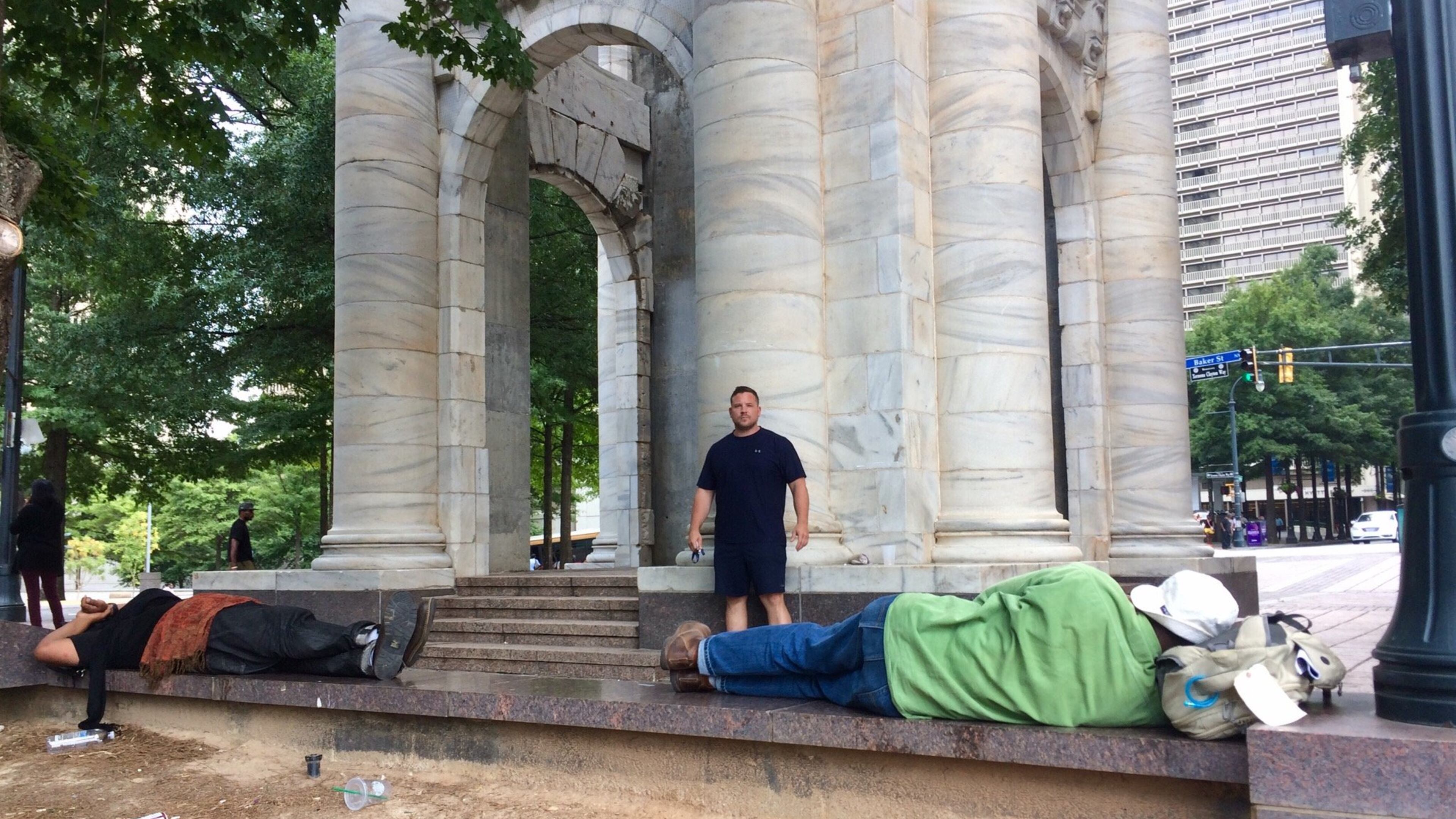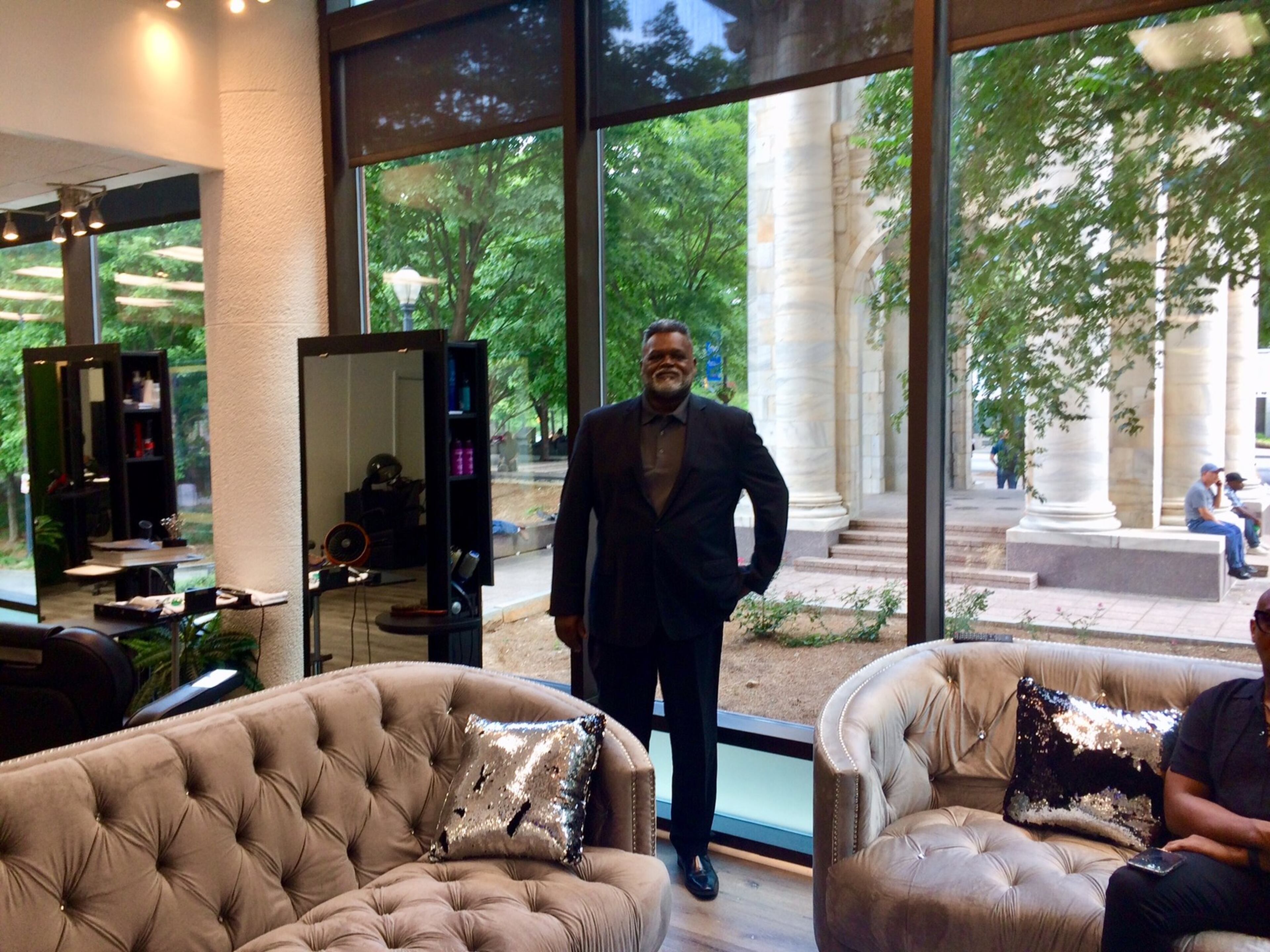Torpy at Large: Homeless complaints up; deja vu all over again

Atlanta’s hoteliers have had it.
Last month, the managers of three Downtown Hotel Heavies fired off a letter to Mayor Keisha Lance Bottoms that in effect said, “C’mon, Ms. Mayor. This is no way for us to treat our guests.”
The Hyatt Regency, Hilton and Marriott Marquis said there was an "alarming increase in complaints from guests" about the homeless during the past few months.
The gripes are timeless: Aggressive panhandling. Tourists feeling intimidated. Unpleasant encounters. Insults. Vagrants bathing in hotel bathrooms.
Those of us living here are largely used to it. But if you traveled from Kansas for a long-awaited convention or to gawk at really big fish — and pay $349 a night for lodging — well, you might consider not returning to our fair city.
Not only are hotel chiefs grumbling, but their neighbors are unhappy, too. At Peachtree and Baker streets is Peachtree Towers, a 1960s building with 330 condos and a scenic view of Atlanta’s unmade bed — Hardy Ivy Park, an otherwise adorable pocket park with a classical monument constructed with pillars from the historic Carnegie library boorishly torn down decades ago.
But when I stood there the other afternoon, I couldn’t help hoping for an afternoon thunderstorm to wash away the distinct bouquet of dried urine that wafted with the summer breeze.
On the building’s first floor is Atlanta Style Bar, a swanky salon owned by John Wilkins, the entrepreneurial brother of retired Hawks star Dominique Wilkins. The business has a series of massive windows overlooking the park. What should be a selling point is actually the problem.
“You have homeless sleeping there, doing drugs, fighting, harassing customers,” said John Wilkins. “When women go out the front door, the homeless swarm them, looking for money. The women cringe.”

Wilkins has been in this space just two weeks and ran a previous salon a couple of blocks away. The problems in the area have gotten worse the past few months, he said, causing him to call the cops probably five times in two weeks.
“It’ll kill the business, or at least make it hard,” Wilkins said. “I’m trying to get someone from the city to make a move.”
Complaints about people being harassed downtown by pushy panhandlers (they are often not homeless) and folks being made frightened or uncomfortable are nothing new. But the recent surge is not surprising, according to anecdotal reports.
Let us enumerate:
• 3,217 — the number of homeless people in Atlanta identified during January's "point-in-time" count, a 3% increase from the previous year. (The city is quick to say that's still a 25% drop from 2015. The stats say 973 people who were counted suffer from mental illness and 1,040 from substance abuse problems — strangely exact numbers for a very fluid and inexact counting process.)
• 6,163 — that’s how many times cops or Downtown Ambassadors had to encounter someone for panhandling during the first six months this year, an 18% increase compared to the same time last year, according to Central Atlanta Progress, a community development organization that works to strengthen the downtown economy.
• 20,209 — “homeless interventions” (“interactions” might be a more accurate term) with cops or Downtown Ambassadors in the first six months downtown, an 83% increase from last year.
• 1,120 — the number of “quality of life” arrests so far this year by Atlanta cops in Zone 5 (which includes downtown and Midtown), down 13%.
• Also, a little good news. Larcenies from autos in Zone 5 so far this year — 1,176 — are down 17%. (But let’s not get carried away. Overall raw crime numbers are down across the city, but that’s because cops have really helped beat down car break-ins. However, many other serious crimes have inched upward.)

So, this begs the question, why are there seemingly more homeless people around downtown?
At first blush is that the massive Peachtree Pine shelter, which used to house 500 or more homeless a night and allow many to stay there each day, was closed down. Those folks were largely absorbed by other shelters, and a good number of them were "housed." But many other "service resistant" homeless who used to hang out near The Pine no longer can do so. That means they must find new hangouts.
In fact, several of the established “hangouts” are being swept up: Near Georgia State University, the Central Library is closed for remodeling, and the airport has gotten better at chasing people away.
The new city policy of getting rid of cash bail and the ensuing effort to close down the city jail has had an impact, some cops tell me. There's no real mechanism for holding people for petty crime.
It used to be police could jail an especially bothersome person for 24 to 48 hours for infractions like peeing on sidewalks, disorderly conduct or aggressive panhandling. But since so many of them can get released right away, police are not making as many such arrests. It’s sort of a “why bother?” attitude. (The city jail had 95 people Friday afternoon on city violations. It used to have around 250.)
“We’re concerned there are no consequences for actions,” said David Wardell, head of public safety for Central Atlanta Progress. The city and other agencies are trying to treat rather than arrest, and there has been some progress.
But, said Wardell, “It’s overwhelming. You help 20 and 20 more come the next week.”
It’s like the waves at the beach.
The Police Department did not want to talk about the issue and passed me onto the mayor’s office. I don’t blame them. How many times can you repeat the same answers to the same questions?
I tried to get a comment from the mayor’s office without result. Recently, her office told WSB that addressing homelessness “remains a top priority for the Mayor, and we continue to work with our partners to leverage resources — both public and private — to work toward lasting solutions.”
The mayor was apparently referring to a $50 million effort where the city sold $25 million in bonds and got nonprofits to raise another $25 million. I hear that program to build more housing and provide more social services is getting ready to go.
We’ll see how it affects life on the streets.


